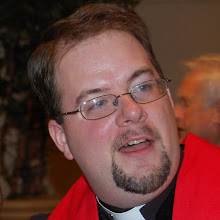
I've noticed in a number of places the trend of opposing "religion" with "faith." Setting up these two concepts as foils--as in "religion does x badly, while faith is perfectly y"--might be catchy, but is terribly false.
The underlying concept seems to be something like religion, religiosity, etc. all have an institutional component which squeezes out the main point of belief. So I know many Christians who refuse to describe or understand their belief as "religion," in either a descriptive or normative sense. However, to speak about Christian belief as non-religious ("we're a faith") is disingenuous. It masks the institutional qualities which the Christian faith not only posseses now, but has since apostolic times. In every form/time/place, there is leadership, doctrine, and ministries--all of which are institutional, supposedly "religious" characteristics.
Furthermore, describing Christian belief as only a "faith" panders to those who believe that you can be "spiritual," whatever that means, without being "religious." Christian faith is a robust expression that encompasses heart, head, and hands, which cannot be lived out without a vital connection to others in a community of faith. To portray a "me & Jesus faith" (which admittedly many are hawking on street corners and in Starbucks) is a vapid and shallow expression of what is intended to be dynamic and engaging. If we want to talk about institutionalism or fossilization, about what our call and mission is...well, that would be great. But to disparage religion as if it is ossified by virtue of what it is is just smoke and mirrors.
If we would speak of religion, let's begin with etymology. Our English word is derived from the Latin
religio, which means "to bind." Think about what religion does for believers. What does "religion" actually describe?
When I talk at the university about religious belief (to a diverse and usually skeptical audience), I generally ask these questions:
What binds us to nature/the created order?
What binds us to one another?
What binds us to God/ultimate reality?
Answering these questions move us away from the false dichotomy of religion/faith, and toward a deeper appreciation of what religion attempts to accomplish.
Moreover, it exposes the fact that human beings naturally ask these big questions. In this sense, we are
homo religious. This is why the academic study of religion has an important role to play at universities and colleges. Unfortunately, many state schools--including the institution I serve--have an anemic department at best.
This approach to "religion" reminds us that you don't have to be an adherent of a religion to possess religious beliefs. Not a fervent believer in God? You can still hold religious beliefs deeply. In fact, the most secular scientist will have a strong grasp on humanity's place in the universe. That's a religious belief.
To make religion and faith into polar opposites is just plain silly. Let's start thinking about what we believe about who were are and where we are, and see how that might actually draw us closer together. It might turn out that we're bound together in ways that would surprise us!








